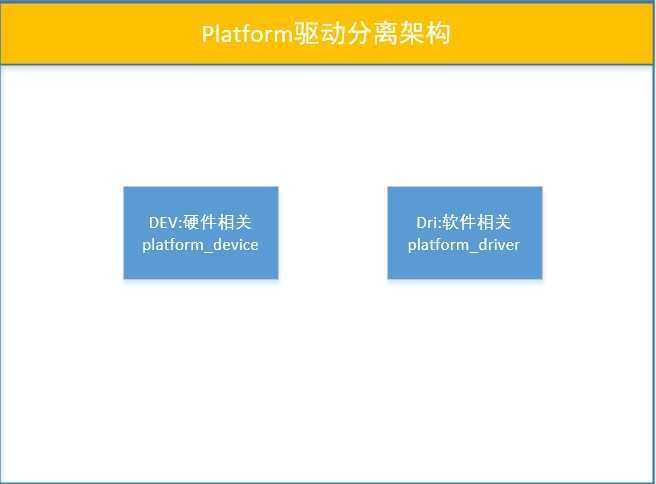platform的bus总线结构将一个硬件驱动分为device设备和driver驱动两部分。使用platform将两个联系到一起

就是把device和driver分开注册到内核中去。在根据相应的name之类的去匹配使用。
device_driver:device和driver的相关性数据和函数存放
struct device_driver {
const char *name; //设备驱动程序的名字
struct bus_type *bus; //所属总线类型
struct module *owner; //模块所有者
const char *mod_name; /* used for built-in modules */
bool suppress_bind_attrs; /* disables bind/unbind via sysfs */
const struct of_device_id *of_match_table; //match device table
int (*probe) (struct device *dev); //匹配度到设备的name与driver中的name一致时将会在注册时执行
int (*remove) (struct device *dev); //移除一个绑定的驱动
void (*shutdown) (struct device *dev); //关机
int (*suspend) (struct device *dev, pm_message_t state); //将设备调到休眠模式
int (*resume) (struct device *dev); //唤醒休眠模式
const struct attribute_group **groups;
const struct dev_pm_ops *pm; //电源管理操作
struct driver_private *p;
};
platform_device :硬件相关
struct platform_device {
const char * name;
int id;
struct device dev;
u32 num_resources;
struct resource * resource;
const struct platform_device_id *id_entry;
/* MFD cell pointer */
struct mfd_cell *mfd_cell;
/* arch specific additions */
struct pdev_archdata archdata;
};
platform_driver
这里的platform是一个普通的驱动,可用最原始的方法来注册创建class类,再在下面添加具体的设备文件来使用。platform只是bus中的一种,挂载到platform_bus_type。
struct platform_driver {
int (*probe)(struct platform_device *);
int (*remove)(struct platform_device *);
void (*shutdown)(struct platform_device *);
int (*suspend)(struct platform_device *, pm_message_t state);
int (*resume)(struct platform_device *);
struct device_driver driver;
const struct platform_device_id *id_table;
};
resource
struct resource {
resource_size_t start;
resource_size_t end;
const char *name;
unsigned long flags;
struct resource *parent, *sibling, *child;
};
platform_get_resource
获取platform资源
struct resource *platform_get_resource(struct platform_device *dev, unsigned int type, unsigned int num)
// type:资源类型
// num:资源索引
platform_driver_register-
int platform_driver_register(struct platform_driver *drv)
platform_driver_unregister
void platform_driver_unregister(struct platform_driver *drv)
platform_device_register
int platform_device_register(struct platform_device *pdev)
platform_device_unregister
void platform_device_unregister(struct platform_device *pdev)
led_dev.c
//定义资源
static struct resource myled_resource[] = {
//内存资源
[0] = {
.start = 0x56000050,
.end = 0x56000050 + 8 - 1,
.flags = IORESOURCE_MEM,
},
//中断资源
[1] = {
.start = 4,
.end = 4,
.flags = IORESOURCE_IRQ,
},
};
static int myled_release(struct platform_device *pdev)
{
}
static struct platform_device myled_dev = {
.name = "myled",
.id = -1,
.num_resources = ARRAY_SIZE(myled_resource), //申请内存
.resource = myled_resource, //赋值
.dev = {
.release = myled_release, //释放函数
},
};
static int myled_init(void)
{
platform_device_register(&myled_dev);
return 0;
}
static void myled_exit(void)
{
platform_device_unregister(&myled_dev);
}
module_init(myled_init);
module_exit(myled_exit);
MODULE_LICENSE("GPL");
led_drv.c
static struct class *myled_class;
static struct class_device *myled_device_class;
static volatile unsigned long *gpfcon;
static volatile unsigned long *gpfdat;
static unsigned int pin;
static int myled_open (struct inode *inode, struct file *file)
{
/* 设置gpio */
*gpfcon &= ~(3 << (pin * 2));
*gpfcon |= (1 << (pin * 2));
return 0;
}
static ssize_t myled_write (struct file *file, const char __user *buf, size_t count, loff_t *ppos)
{
int val;
copy_from_user(&val, buf, count);
if(val)
{
/* 点灯 */
*gpfdat &= ~(1 << pin);
}
else
{
/* 灭灯 */
*gpfdat |= (1 << pin);
}
return 0;
}
static struct file_operations myled_fops = {
.owner = THIS_MODULE,
.open = myled_open,
.write = myled_write,
};
int major;
static int myled_probe (struct platform_device *pdev)
{
struct resource *res;
/* 从平台获取信息 */
//根据platform_device的资源进行ioremap
res = platform_get_resource(pdev, IORESOURCE_MEM, 0);
gpfcon = ioremap(res->start, res->end - res->start + 1);
gpfdat = gpfcon + 1;
res = platform_get_resource(pdev, IORESOURCE_IRQ, 0);
pin = res->start;
/* 注册字符设备 */
major = register_chrdev(0, "myled", &myled_fops);
myled_class = class_create(THIS_MODULE, "myled");
myled_device_class = class_device_create(myled_class, NULL, MKDEV(major, 0), NULL, "myled");
return 0;
}
static int myled_remove(struct platform_device *pdev)
{
/* 卸载字符设备 */
unregister_chrdev(major, "myled");
class_device_unregister(myled_device_class);
class_destroy(myled_class);
iounmap(gpfcon);
}
static struct platform_driver myled_drv = {
.probe = myled_probe,
.remove = myled_remove,
.driver = {
.name = "myled",
},
};
static int myled_drv_init(void)
{
platform_driver_register(&myled_drv);
return 0;
}
static void myled_drv_exit(void)
{
platform_driver_unregister(&myled_drv);
}
module_init(myled_drv_init);
module_exit(myled_drv_exit);
MODULE_LICENSE("GPL");
led_test.c
int main(int argc, char **argv)
{
int fb;
int val;
fb = open("/dev/myled", O_RDWR);
if(fb < 0)
{
printf("can‘t open!\n");
}
if(argc != 2)
{
printf("Uage: \n");
printf("%s <on | off>\n", argv[0]);
return 0;
}
if(strcmp(argv[1], "on") == 0)
{
val = 1;
}
else
{
val = 0;
}
write(fb, &val, 4);
return 0;
}
Makefile
KERN_DIR = /home/book/linux-2.6.22.6
all:
make -C $(KERN_DIR) M=`pwd` modules
clean:
make -C $(KERN_DIR) M=`pwd` modules clean
rm -rf modules.order
obj-m += led_drv.o
obj-m += led_dev.o原文:https://www.cnblogs.com/huangdengtao/p/13336659.html